Gearing Up for a New School Year – Plans for 2016-2017
It's that time of the summer. I've been working out our curriculum and schedule for next year, and I'm ready to share it with you! It's so wonderful to be homeschooling with Classical Conversations. So much of what we do is governed by our connection with our community. At home, we still have freedom in how we pursue each of the subjects of study. Every family will look a little different. Ours has even looked a little different each year. It's going to be our seventh year in Classical Conversations, and I continue to enjoy learning classically with friends.
Today I'll outline the content of our studies, and tomorrow I'll lay out a basic schedule for what our day will look like.
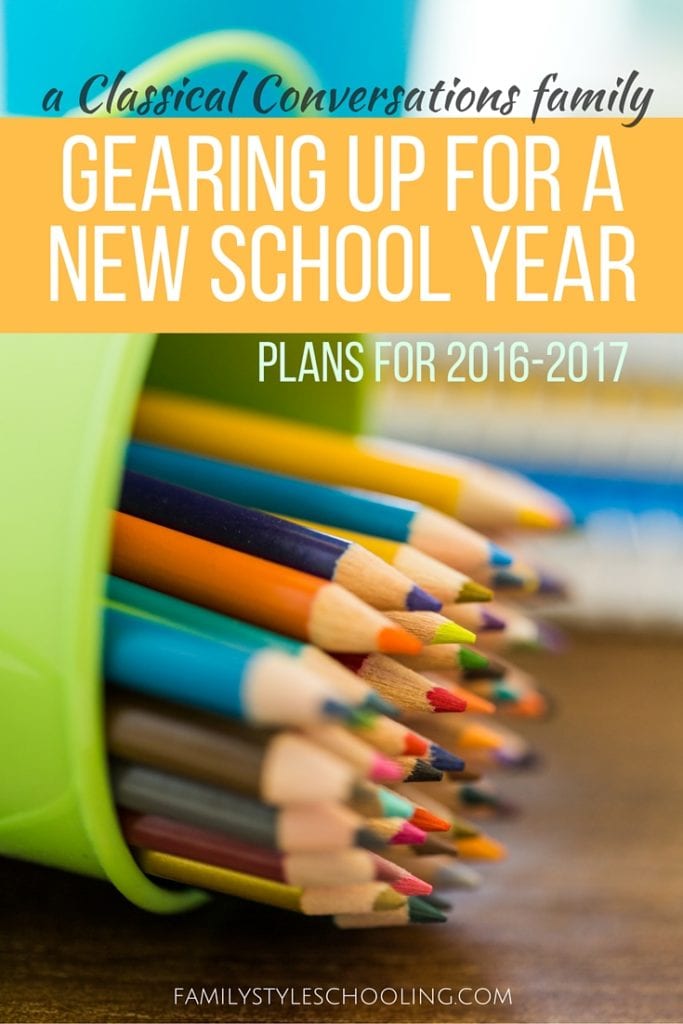
I will have five students learning in my home this year. If you're scratching your head in wonder, yes, that is two more than usual. Our family is helping out a friend by homeschooling their kids. So the new ages for students in my home are 15 (a Sophomore in Challenge 2), 12 (7th grade in Challenge A), 10, 10 (5th graders in Foundations and Essentials), and 8 (2nd grader in Foundations). I'm going to share our plans for each area of focus and give details for how that will look for each age group of kids.
What We're Studying
Grammar:
Grammar is an everyday part of our school year plan. Because I desire my kids to be excellent communicators, they need to know the parts of speech, how to structure a sentence, how to spell, and how language in general works.
The Sophomore:
He's going to continue his Latin studies in Henle 2. You'd be amazed at how much you can learn about English grammar by learning Latin. It also is a great way to prep for the SAT vocab!
The 7th grader:
She's starting her formal Latin studies in Henle 1. We've been working on vocabulary and memorizing her declension endings by copying charts.
The 5th graders:
It will be the 2nd tour of Essentials for one, and the 1st tour of Essentials for the other. We'll be copying lots of charts, and diagramming sentences. I love the Essentials program. We'll also be working through Spell to Write and Read for spelling. This material has been one of the best investments. It's really encouraged my struggling reader, and been a great resource to use for all of my students.
The 2nd grader:
In second grade, there's not a lot of grammar to work on. She'll do spelling with the 5th graders, and she'll also copy charts and diagram sentences with them. Her main grammar work will be copy work in her handwriting book.
Exposition/Composition:
The best way to learn how to think is by exposing students to great books, and allowing them to respond to them in writing. We will read books together as a family, but I never plan those out for the whole year in advance. I like to see where the Lord leads as the year progresses. Here's their individual plans:
The Sophomore:
British Literature - woot! I'm so excited about the Challenge II book list. It's filled with big ideas of epic adventures, true love, and murder mystery. He'll be writing papers that bring some of thes big ideas together throughout the year. Here's his list of books:
- Beowulf
- Selected Canterbury Tales by Geoffrey Chaucer
- Sir Gawain and the Green Knight retold by J.L. Weston
- Paradise Lost by John Milton
- The Pilgrim's Progress by John Bunyan
- Gulliver's Travels by Jonathan Swift
- Pride and Prejudice by Jane Austen
- A Tale of Two Cities by Charles Dickens
- Jane Eyre by Charlotte Bronte
- Animal Farm by George Orwell
- A Passage to India by E.M. Forster
- Something Beautiful for God by Malcolm Muggeridge
- Alice's Adventures in Wonderland by Lewis Carroll
- Robinson Crusoe by Daniel Defoe
- Favorite Father Brown Stories by G.K. Chesterton
- A Morbid Taste for Bones by Ellis Peters
- Out of the Silent Planet by C.S. Lewis
- The Hobbit by J.R.R. Tolkien
- The Screwtape Letters by C.S. Lewis
The 7th Grader:
She'll be delving into Newberry-awarded literature as she contemplates the idea of owning her education. At the same time, she'll be learning to write persuasively using the Lost Tools of Writing. Here's her book list:
- The Lion, the Witch and the Wardrobe by C.S. Lewis
- Carry On, Mr. Bowditch by Jean Lee Latham
- The Magician's Nephew by C.S. Lewis
- Number the Stars by Lois Lowry
- Amos Fortune, Free Man by Elizabeth Yates
- The Secret Garden by Frances Burnett
- The Door in the Wall by Marguerite de Angeli
- A Gathering of Days by Joan W. Blos
- Crispin: The Cross of Lead by Avi
- The Bronze Bow by Elizabeth Speare
The 5th Graders:
It would be simple to say that my fifth graders were reading the same books and discussing the same ideas. Since we're still working on becoming strong readers, I have a bookshelf of books for them to each pick from that is appropriate for their level. They will have independent reading time for this. For writing, they'll be using the Medieval Writing Lessons by IEW.
The 2nd Grader:
She'll be reading to me books from her shelf. Then we'll be working through IEW's Bible Heroes: Writing Lessons in Structure & Style. Short and simple!
Research:
Research defines the science studies at our home school. We are constantly working on becoming better observers and fostering the faculty of wonder. Here's what that looks like from a curriculum standpoint:
The Sophomore:
He'll be digging into the Apologia Biology text this year. This is a lab science he takes through Classical Conversations. I love that he gets to look through a microscope at pond scum he's collected. When they're not completing the labs, they are discussing the chapters. This is such a valuable part of cultivating wonder.
The 7th Grader:
She'll be researching fascinating creations and writing about them in a sketch notebook. Once she's completed her research, she'll take it to her CC class and share her findings. With all of her class researching the same idea, her mind will be expanded in wonder by the variety and creativity of a great Designer. She'll also be learning to draw the body systems.
The 5th & 2nd Graders:
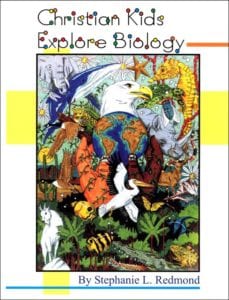 I'll combine my younger students to follow the general theme of the family's research studies. We'll work through Christian Kids Explore Biology. I love this curriculum because it's written from a Christian worldview, it is intended to take two days a week for teaching time, and it works with multiple kids at the same time. We'll add this to the extended part of our morning time after the big kids are released.
I'll combine my younger students to follow the general theme of the family's research studies. We'll work through Christian Kids Explore Biology. I love this curriculum because it's written from a Christian worldview, it is intended to take two days a week for teaching time, and it works with multiple kids at the same time. We'll add this to the extended part of our morning time after the big kids are released.
Math
We do math daily for an hour (except my 2nd grader). It's a muscle building, mind conditioning, critical thinking necessity. There is no way I can sit with each student on each level to work with them. That is a mathematical impossibility when it comes to the time I have in a day! I do have some tricks up my sleeve to help pull this off. Oh, and everyone does Saxon (except my 2nd grader). I fought against it at first, but I've really come to see the beauty and excellence of the material that I can't fight it anymore.
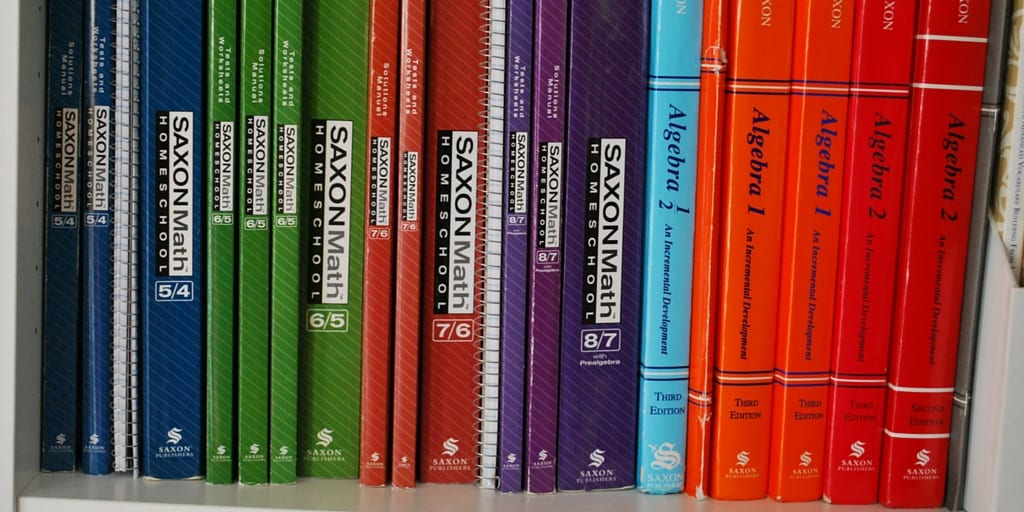
The Sophomore
He's working into Algebra 2 this year. I did sit down last year and work his math with him when he started having trouble. This year, we're going back to the Art Reed DVD's. I love these because my son really enjoys learning from Art Reed. My husband is taking over tutoring Challenge 2 this year, so I'm hoping that he'll be able to fill in the gaps when trouble arises in math. As much as I'd love to stay up to speed with his math, I don't know if it will happen.
The 7th Grader
She's going to be working in Saxon 8/7. I also have the Art Reed DVD's for her to use. She might not need them for every lesson since this text is really a review of all elementary math. I want her to have it as a resource though, so I don't have to explain every lesson. I'll be there if she gets stuck on a problem.
The 5th Graders
One will be working in Saxon 5/4, and the other in Saxon 6/5. Everyone is really in a different level of math, so I want them to be working where they need to be, and not trying to make one fit the other. I'll sit and work through the lesson with each one individually, and then they'll work the mixed practice independently. One day a week, I'll let them substitute their mixed practice with Life of Fred.
The 2nd Grader
My youngest logician will be using Sunrise Math from Christian Light Publications. I'm not a fan of the Saxon math series before Saxon 5/4. They are very fun studies, don't get me wrong. They simply take too much time from a teacher's standpoint. I feel like they were written to keep a class busy for an hour. The Sunrise Math series is similar to Saxon, but it offers more independence for the students. It's good at reviewing the basics, while still keeping it short and fun for a second grader.
History
History gets a greater emphasis as my students get older. When they're young, they memorize facts, and dabble in history. As they get older, they discuss big ideas and dig in deep.
The Sophomore
He's studying Western cultural history this year. What an awesome treasure trove to feast upon. He will get to read about and discuss belief systems that center around man instead of God. What happens when man puts himself as the center? The theme for Challenge II in Classical Conversations is choices. There are some great controversial choices to discover within this realm of study. It's going to be a great year!
- The Annotated Mona Lisa by Carol Strickland
- State of the Arts by Gene Edward Veith, Jr.
- The Gift of Music by Jane Stuart Smith and Betty Carlson
- Classical Music for Dummies, 2nd Ed. by David Pogue and Scott Speck
- How Should We Then Live? by Francis Schaeffer
The 7th Grader
The focus of history in Challenge A is world geography. She will memorize countries, capitals, and features, as well as learn to draw the entire world. This is such a foundational area of study that most people skip! The history of the world comes alive when you know the world!
The 5th & 2nd Graders:
History is another subject where studies combine for my younger students. We'll be reading through timeline cards during our morning time, but our main source for history is The Mystery of History, Volume 2: The Early Church and the Middle Ages. We'll read a bit from it each day and discuss it. I won't be adding on too many extra activities though. Like I said, I'm laying a foundation right now, and later we'll dig deeper!
Rhetoric/Wisdom Studies
Our goal in education is to know God and make Him known. We have to both know who God is and how to communicate His truth to others.
The Sophomore:
While he studied Logic in Challenge B, he'll revisit it in Challenge II, but this time apply his understanding of Logic in determining the validity of arguments in Traditional Logic I. I love this pursuit, as learning to find flaws in arguments can be a powerful tool for seekers of Truth. He'll also be reading and discussing Plato's Gorgias. It's a Socratic dialog (a conversation Socrates had with Gorgias and others) that discusses ideas about seeking truth, asking good questions, and clearly defining terms.
The 7th Grader:
I'm so excited to dive into It Couldn't Just Happen with another student. This was one of my favorite books from Challenge A my first time around. It's going to be fun to read and discuss it again. The book presents an argument for a Designer while breaking down the case for evolution. We'll also be reading The Fallacy Detective. It's so important to know how to hear arguments being made, and be able to process them with wisdom.
The 5th and 2nd Graders:
We'll continue reading through Two Spies on a Rooftop in our morning time. It's a wonderful Bible story book that does a great job of telling the stories of the Old Testament while drawing out the deeper truths of the Bible. The older kids will join us in this reading time and help our discussions flourish.
Music
Everyone has an instrument that they will continue to practice throughout the year. It's as simple as carving out thirty minutes each day to work on their instrument. The trickier part is finding enough time for everyone to have a turn on the piano! We do have a keyboard set up in a different room, so sometimes we can have dueling pianos going on throughout the house.

Tomorrow I'll outline what our daily schedule will look like, and how I keep up with what everyone is doing day-to-day!
Need some help planning your year? Check out this great guide by Pam Barnhill of edSnapshots:
Betsy Strauss is an unexpected homeschooler, mother of three, who is in a relationship with a sweet man for life. She loves reading books, drinking coffee, and learning anything with her kids.

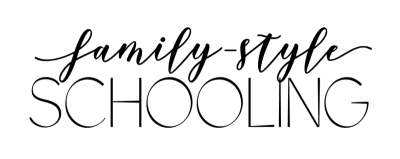
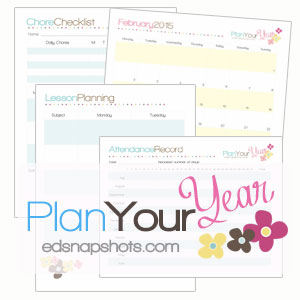
Amazing! Look forward to seeing your daily schedule. Thanks for putting this together, Betsy.
You mentioned a shelf of age appropriate/level books for your 5th and 2nd graders. Do you use a specific list of books or pick specific ones for each year that you want your kids to have read? It seems there are so many lists of great books to read, how do you choose? Do you base it on their interests or just that by the end of the year, they need to have read all of the books on their shelf?
Thanks for all of the ideas, Betsy. During the summer, I am always trying to find ways to simplify and yet still inspire my children and you have so many wonderful ideas (and children)!
I look for a mix of books that I want them to read and that might appeal to them on their reading level. Then I let them choose from there. They don’t have to read them all…I pick way too many books for that! I don’t really pick from a list, but that just might be because I’ve had two students that have gone through these books already. I scoured book lists my first round. When I get their shelves ready, I’ll add a picture to the post and let you know!